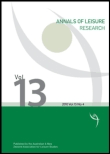
Annals of Leisure Research
Scope & Guideline
Charting New Territories in Leisure Research
Introduction
Aims and Scopes
- Interdisciplinary exploration of leisure:
The journal promotes a broad range of interdisciplinary research that examines leisure from various academic fields, including sociology, psychology, environmental studies, and cultural studies. - Focus on social justice and inclusion:
A core aim is to investigate how leisure can serve as a platform for social justice, equity, and inclusion, particularly for marginalized groups, including Indigenous communities, women, and people with disabilities. - Impact of leisure on well-being:
Research often centers on the relationship between leisure activities and individual well-being, addressing physical, mental, and social health outcomes. - Sustainability and environmental considerations:
The journal addresses environmental sustainability within leisure practices, exploring how leisure can contribute to sustainable development and ecological awareness. - Cultural representations and community engagement:
It emphasizes the cultural aspects of leisure, including how leisure activities reflect and shape community identities, cultural values, and social interactions.
Trending and Emerging
- Leisure and mental health:
A significant increase in research examining the mental health benefits of leisure activities, especially in light of the pandemic, underscores the importance of leisure in fostering psychological well-being. - Digital leisure experiences:
The rise of digital and virtual leisure experiences, including online events and activities, reflects changing consumption patterns and the impact of technology on leisure practices. - Community-based leisure initiatives:
There is a growing focus on community-driven leisure programs that empower marginalized groups, emphasizing co-design and participatory approaches to leisure development. - Environmental sustainability in leisure:
Research exploring the relationship between leisure and environmental sustainability has gained traction, with a focus on how leisure practices can contribute to ecological awareness and conservation efforts. - Leisure during crises:
Emerging studies on how leisure practices adapt and transform during crises, including pandemics and economic downturns, highlight the resilience and adaptability of leisure in challenging times.
Declining or Waning
- Traditional leisure activities:
Research on conventional leisure activities, such as passive entertainment forms (e.g., television watching, traditional sports), appears less frequently, as there is a shift towards examining more dynamic and participatory forms of leisure. - Narrow demographic studies:
There seems to be a waning interest in studies focusing on narrow demographic groups without a broader social justice context, as the journal increasingly emphasizes inclusivity and diversity in leisure research. - Leisure and consumerism:
The exploration of leisure strictly from a consumerist perspective is decreasing, as there is a growing focus on the social and cultural implications of leisure rather than mere consumption.
Similar Journals

Journal of Cross-Cultural Gerontology
Illuminating the Cultural Dimensions of AgingJournal of Cross-Cultural Gerontology, published by SPRINGER, is an influential academic journal that focuses on the complex interactions between culture and aging in a global context. Since its inception in 1986, this journal has committed to exploring the multifaceted aspects of gerontology through an interdisciplinary lens, making it a valuable resource for researchers, healthcare professionals, and students alike. The journal is ranked in the second quartile of both Geriatrics and Gerontology and Health (social science), reflecting its substantial contribution to the field and its commitment to high-quality research. With an impact factor that showcases its relevance within the scholarly community, the journal provides a platform for empirical studies, theoretical discussions, and critical reviews that address the needs and challenges of an aging population across diverse cultural settings. Although it does not currently offer open access, its robust indexing and reputation within the Scopus database—ranking #134 out of 371 in Social Sciences (Health) and #65 out of 116 in Medicine (Geriatrics)—underscore its impact and credibility in the field. By bridging cultural perspectives and gerontological research, the Journal of Cross-Cultural Gerontology stands as a pivotal resource for advancing knowledge and practices in aging-related studies.
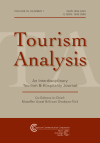
Tourism Analysis
Unlocking Insights for a Vibrant Tourism Future.Tourism Analysis, published by COGNIZANT COMMUNICATION CORP, is a pivotal journal in the field of Tourism, Leisure, and Hospitality Management. With a dedicated focus on the complexities and dynamics of the tourism industry, the journal has been a crucial platform for sharing innovative research since its inception in 2001. The journal is recognized within Scopus rankings, holding a respectable position in the 39th percentile among its peers, reflecting its value in scholarly communication. Although it does not currently operate as an Open Access journal, Tourism Analysis provides access to a wealth of insights and studies that cater to academic researchers, industry professionals, and students striving to enhance their understanding of tourism trends and impacts. With its commitment to rigorous peer review and diverse contributions, the journal plays a significant role in advancing knowledge and fostering discussions in the rapidly-evolving tourism sector.
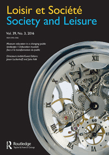
LOISIR & SOCIETE-SOCIETY AND LEISURE
Bridging Research and Practice in Leisure StudiesLOISIR & SOCIETE-SOCIETY AND LEISURE, published by Taylor & Francis Ltd, is a distinguished journal that provides a platform for research at the intersection of leisure studies, sociology, and political science. With a rich history spanning from 1978 to 2024, this journal seeks to explore the multifaceted roles of leisure within society and its implications for social dynamics. Although the journal's current impact factor remains under development, its categorization in the Q4 quartile for both Metals and Alloys, as well as Sociology and Political Science, reflects its ongoing contribution to these fields. Engaging researchers, professionals, and students alike, LOISIR & SOCIETE invites submissions that critically address the social contexts of leisure, promoting dialogue and exploration of contemporary socio-political issues. The journal's commitment to access may vary, ensuring diverse perspectives are presented within its pages, thus emphasizing its significance in advancing scholarly discussion on leisure."

Acta Turistica
Advancing Knowledge in the Heart of Tourism ResearchActa Turistica is a specialized academic journal based in Croatia, published by EKONOMSKI FAK SVEUCILISTA, KATEDRA TRGOVINU & TURIZAM. Focused on the interdisciplinary domains of tourism, leisure, and hospitality management, this journal serves as a vital platform for researchers, professionals, and students aiming to contribute to the evolving landscape of these fields. With an ISSN of 0353-4316 and an E-ISSN of 1848-6061, it is indexed in various databases, although it currently does not offer an open access option. Despite being categorized in the Q4 quartile across multiple disciplines as of 2023—including Economics, Geography, and Tourism—the journal is poised to publish significant findings that could enhance knowledge and practices within these sectors. Its Scopus rankings highlight the need for growth and improvement, especially within its niche markets. As it converges from 2018 to 2024, Acta Turistica invites high-quality research that addresses pressing issues in travel and tourism, advocating for innovation and sustainable practices in a rapidly changing global environment.
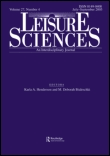
LEISURE SCIENCES
Transforming Perspectives on Leisure and Its Global InfluenceLeisure Sciences, an esteemed journal published by Taylor & Francis Inc, serves as a prominent platform for the dissemination of innovative research within the realms of Environmental Science, Sociology, and Tourism and Leisure Management. Since its inception in 1977, this journal has garnered significant attention, maintaining a prestigious Q1 ranking in Sociology and Political Science and consistently ranking well in Environmental Science as well as Tourism, Leisure, and Hospitality Management, demonstrating its vital contribution to these interdisciplinary fields. With an impact factor that reflects its scholarly influence, Leisure Sciences continues to shape the future of research in leisure studies, providing researchers, practitioners, and students with valuable insights and comprehensive analyses. The journal is committed to advancing knowledge and understanding of leisure phenomena, addressing the complex interplay of sociocultural, environmental, and economic factors that affect leisure practices across diverse contexts.

Gran Tour
Fostering Interdisciplinary Dialogue in the World of Travel.Gran Tour is a distinguished academic journal dedicated to exploring the multifaceted dimensions of tourism, culture, and leisure studies. Published by UNIV MURCIA, this Open Access journal has been providing a platform for innovative research since its inception in 2010, ensuring that scholarly work is accessible to a global audience. With its ISSN 2172-8690, Gran Tour aims to foster an interdisciplinary dialogue among researchers, professionals, and students interested in the dynamics of travel and its impact on society. Set in the picturesque city of Murcia, Spain, the journal encourages contributions that promote critical thinking and sustainable practices within the tourism sector. The publication’s commitment to excellence and accessibility makes it an essential resource for those looking to deepen their understanding of contemporary issues in tourism and cultural studies.
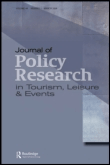
Journal of Policy Research in Tourism Leisure and Events
Driving Change through Evidence-Based Research in LeisureThe Journal of Policy Research in Tourism, Leisure and Events is a leading platform for scholarly discourse at the intersection of tourism, leisure studies, and event research. Published by Routledge Journals, Taylor & Francis Ltd, this esteemed journal, with an ISSN of 1940-7963 and E-ISSN 1940-7971, has established itself as a crucial resource for academics and practitioners alike. With a robust impact reflected in its Q2 ranking in both Geography, Planning and Development and Tourism, Leisure and Hospitality Management, the journal consistently endeavors to shape policy and practice through innovative research. Covering a spectrum of topics from sustainable tourism development to the socio-economic impacts of leisure activities, the journal addresses pressing contemporary issues faced by the industry. It welcomes contributions that advance theoretical understanding and practical implications, fulfilling its objective to foster informed debates and collaborations. The journal is published in the United States and has a noteworthy presence in Scopus rankings, helping ensure that the insights shared reach a wide audience in the relevant fields.
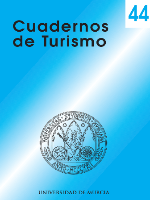
Cuadernos de Turismo
Bridging geography and tourism for sustainable landscapes.Cuadernos de Turismo is a peer-reviewed academic journal published by Universidad de Murcia, focusing on the interdisciplinary fields of geography, tourism, and environmental conservation. Since its inception in 1998, this Open Access journal has provided a platform for researchers, professionals, and students to share innovative research and insights in the domains of tourism, leisure, and sustainable landscape management. Leveraging its Q4 ranking across multiple categories in 2023, Cuadernos de Turismo stands as a crucial resource for exploring contemporary challenges and developments in tourism and its implications for regional planning and environmental conservation. With its commitment to accessibility and scholarly communication, the journal fosters collaboration and dialogue among scholars and practitioners globally, making significant contributions to the understanding and development of sustainable tourism practices.
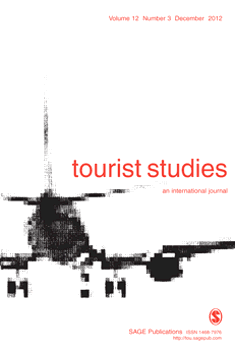
Tourist Studies
Exploring the Dynamics of Travel and LeisureTourist Studies, an esteemed journal published by SAGE Publications Inc, is a leading platform in the field of tourism, leisure, and hospitality management. Operating since 2001 and converging its focus through to 2024, the journal has established itself as a vital resource for academics, professionals, and students who seek to understand the complexities of tourism phenomena. With an impressive Q2 ranking in the 2023 category for Tourism, Leisure, and Hospitality Management, and positioned within the top 75th percentile of Scopus rankings, Tourist Studies fosters critical discourse and research that reflects the latest trends and insights in the sector. While it does not offer open access, the journal's commitment to quality and relevance ensures that published research reaches a wide audience, reinforcing its importance as a scholarly source. The journal encourages submissions that span various interdisciplinary approaches, thereby enriching the understanding of tourism as a socio-cultural, economic, and environmental phenomenon.
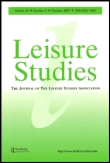
Leisure Studies
Unraveling the Complexities of Leisure ResearchLeisure Studies, published by ROUTLEDGE JOURNALS, TAYLOR & FRANCIS LTD, is an esteemed academic journal dedicated to the multifaceted field of leisure research. With a strong presence since its inception in 1981, this journal continues to play a pivotal role in advancing the understanding of leisure, its social implications, and its impacts on various sectors, including Geography, Tourism, Leisure and Hospitality Management. The journal maintains a notable impact factor evidenced by its classification in the Q1 and Q2 quartiles of relevant categories, highlighting its significance among peers. Leisure Studies is recognized for its rigorous peer-review process and a commitment to publishing high-quality research that explores contemporary issues and theoretical approaches to leisure activities. Although it does not currently offer open access, it remains a vital resource for researchers, professionals, and students aiming to deepen their knowledge and contribute to discussions surrounding leisure practices and policies worldwide. With its Scopus Rankings placing it favorably among its peers, this journal stands out as a leading platform for the dissemination of innovative research in the leisure domain.